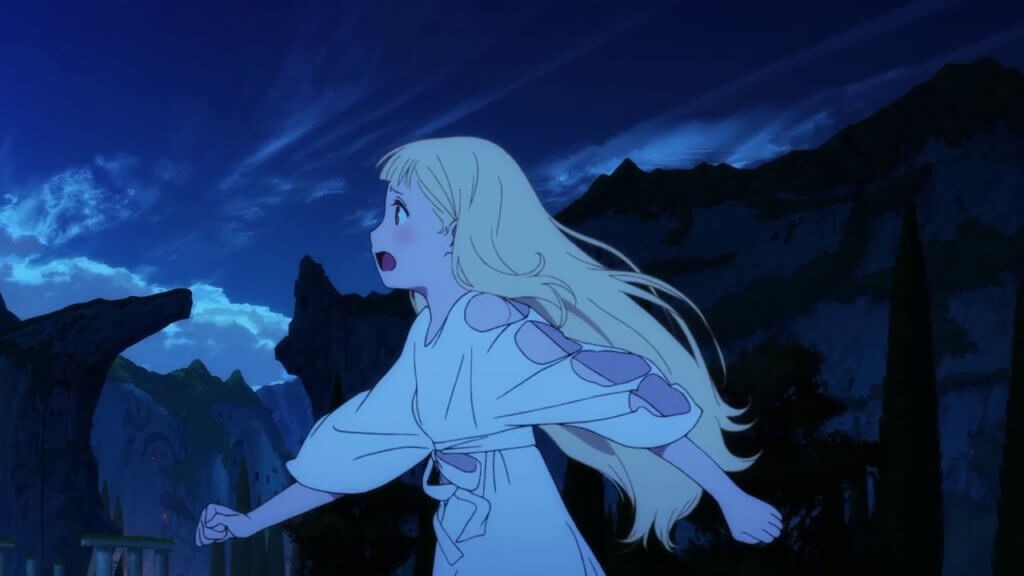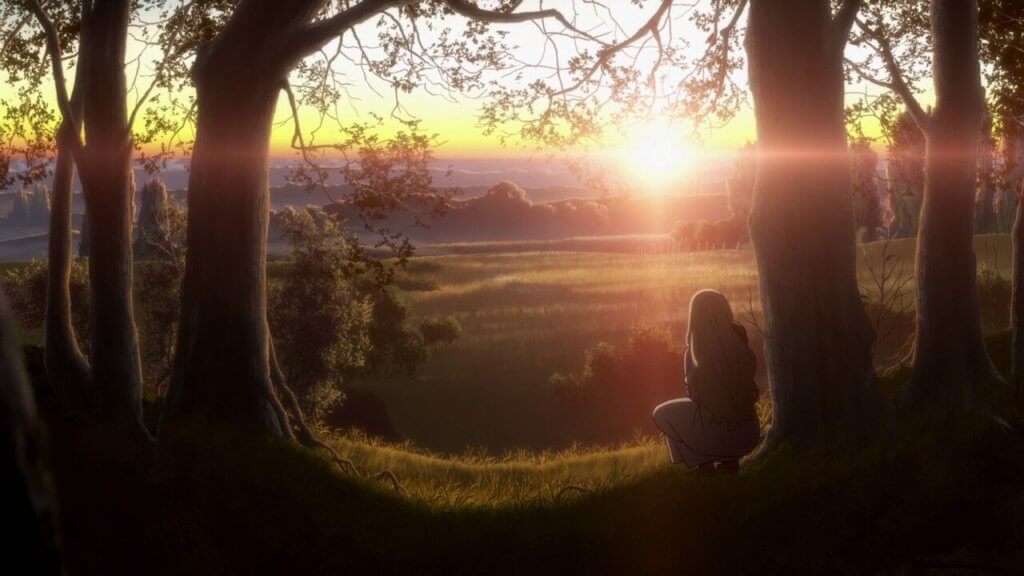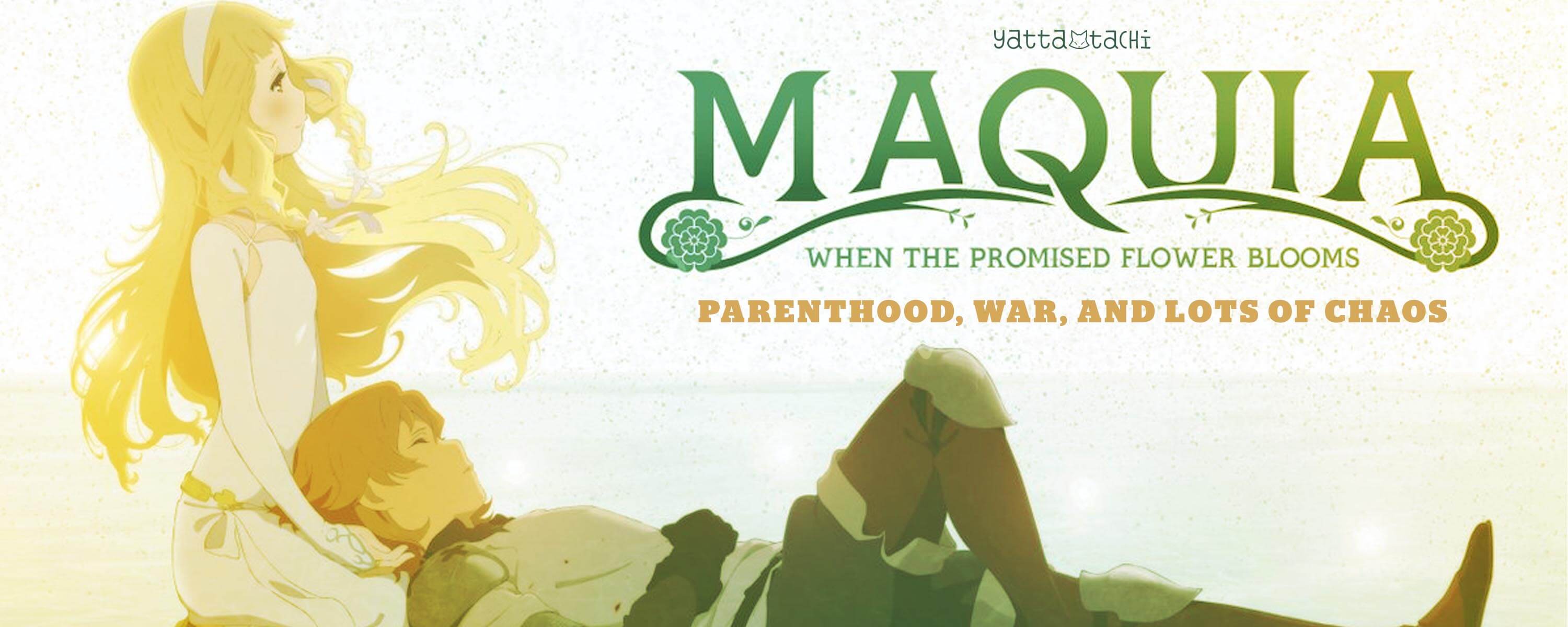For her directorial debut, famed screenwriter Mari Okada introduces a massive world in a fantastical setting, dense with political fractures. Perhaps it may be too dense, because the film itself is rarely interested in the warfare, politics, and status of the world’s races as it treks on for its 115 minute runtime. In fact, the main plot and topic of the film becomes awkwardly sidelined for lengthy stretches as the storyline continuously finds itself having to return and explain the mechanics of its superfluous setting.
Okada has made a name for herself with works that focus on romantic/love polygons intertwining complex worlds and/or characters (Nagi no Asukara, Hanasaku Iroha, Kiznaiver). It can be easy to find these patterns and begin to denounce her work, but pay close attention to Okada’s filmography. She’s also written scenarios for Lupin III: The Woman Called Fujiko Mine and Koufuku Graffiti; two poignant stories that don’t regard love, but rather individual desires and needs/wants. That’s the true core to Okada: stories about people and finding a way to dig deeper into what moves them emotionally.
Maquia finds itself trying to do this for its surprisingly saturated list of characters. “Surprisingly,” because despite its high number of supporting characters, there are only two important ones who truly mean anything to the emotional journey. It’s not like the supporting cast aren’t given their own dilemmas and catharsis, but their journeys are so irrelevant to the overall focus of the story that they all feel frivolous.
A Story With A Crowded Setup

The film follows Maquia, a shy girl from an immortal race of people who stop aging after reaching their mid-teens. Despite being immortal, her parents are gone, which separates her from the rest of the clan. She spends most of her days feeling lonely and having feelings for her best friend’s lover. However, quickly into the film, another kingdom invades their land and slaughters the men of Maquia’s clan. The king, seeking eternity for his bloodline, wants to mate with the women of the clan and produce a child with their unique immortal genes.
While this happens, a dragon literally goes berserk out of nowhere and destroys some towers, consequently allowing Maquia to escape undetected. The dragon drops her off far away from her village, where she finds an orphan baby in the arms of its dead mother (a result from another act of war). Maquia takes it upon herself to save the baby’s life and raise it.
She’s taken in by a kind household, and throughout the years the baby (now named Erial) grows into a young boy. However, gossip spreads across town about Maquia’s race. She is then forced to move to a city where they’ll have more anonymity. Erial, still thinking Maquia is his biological mother, has several heartfelt moments throughout this period.
This doesn’t last for too long though, as Erial begins to age into an adult, whereas his mother hasn’t aged one bit. Erial realizes Maquia isn’t his biological mother, and finds conflict from this. All of this occurs during the first thirty minutes of the two hour long film.
But Wait, There’s More…

As this is happening, there is a growing war between the kingdom that enslaved Maquia’s race and another kingdom that gets introduced literally in the last act of the film. Maquia’s best friend, Leila, becomes the designated woman to bear the king’s child. Not only that, but Leila’s lover (the man Maquia is in love with) has been alive throughout the entire film, coming-and-leaving to constantly remind Maquia who she really is. Some of these reappearances include a kidnapping and trying to ruin a parade. There’s also a romance with Erial and other characters as well that drive some smaller conflicts in the already crowded third act. If that wasn’t enough, Maquia repeatedly runs into a man from her clan who left years before the invasion. His presence leads to some confusion of whether he’s supposed to be a moral compass/voice of reason for Maquia or the devil’s advocate (since he switches between the two in his different appearances).
But among all of this narrative chaos is the mother-son relationship between Maquia and Erial that constantly staples itself over the rest of the minutiae. Being both the saving grace and main purpose of the film, it’s confusing to see why everything else was added. While Maquia’s immortal status proves to be essential for the main conflict between her and Erial, especially in the very final moments of the film, it’s perplexing to consider how everything else fits into one picture.
Thematically and narratively, the film becomes quite a mess towards the end of the first act. Though Okada returns to form for the final minutes of the film, delivering a poignant conclusion to the otherwise exorbitant storyline, it isn’t enough to save it from the rest of the chaotic hundred minutes prior.
Visually Solid

Visually, the film’s use of lighting is amazing in its contrast and distinction. The shading and rays of natural/artificial light give each frame extra dimension, offering it a rare, detailed look for anime. The background art is also amazingly riddled with exhaustive effort, even if the general design of the world doesn’t offer much individuality from other high-fantasy works. Okada seems to have borrowed too much from previous genre set pieces, without bringing any new idiosyncratic perspective into the playing field. Nor does it deliver enough pure entertainment to make its lack of distinction justifiable.
Overall, the character Maquia, sold by the powerful performance from Manaka Iwami, is the main weaponry that gives the film any real impact. Her growth, from shy girl to passionate mother, is the only component that leaves any lasting positive impression from the film. Erial becomes rather difficult to like, considering his actions in the last half of the film. These actions make way for him to redeem himself in the final moments, but they really just weren’t enough.
There aren’t many things that are greatly performed in this film, but the one aspect that did really shined powerfully. The character Maquia calls for empathy, love, and support from the audience; she really does garner that sort of response. Now, if only the rest of the film wasn’t trying to get in the way of it.

Featured Sponsor - JAST
The sweetest romance and the darkest corruption, the biggest titles and the indie darlings; for visual novels and eroge, there's nowhere better.
Big thank you to our supporters
From their continous support, we are able to pay our team for their time and hard work on the site.
We have a Thank-You page dedicated to those who help us continue the work that we’ve been doing.
See our thank you page




